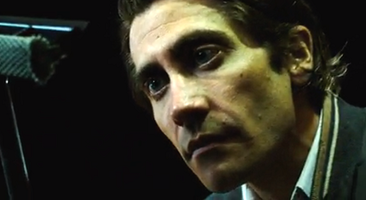B+ |
|

Nightcrawler defies traditional movie vocab. It's very much a character study of Jake Gyllenhaal's Louis Bloom, but calling him a protagonist is far too kind. He's not an anti-hero either, as he's lacking in any truly redemptive qualities. This is the villain in the protagonist chair, something I'm not sure what to call. Dan Gilroy's debut film is a dark ride, daring the viewer to find the bottom of what Bloom is capable of.
Bloom is first depicted as a hustler, stealing scrap metal and fighting a security guard for his watch. He is hungry for a regular job, but his intense need to please is creepy and he speaks in corporate, motivational slogans. Potential bosses turn him away, justifiably. While driving down an LA expressway, he pulls over to gawk at a fiery car wreck, when an amateur film crew shows up with the intent of getting some juicy footage and selling it to the highest network bidder. Seeing the opportunity to make some money and be his own boss, Bloom buys equipment with the proceeds from a stolen bike and catches a carjacking on film. He sells it to Nina (Rene Russo), a morning news director at a low-rated station, and it's off to the races. With his highly flexible ethical code, Bloom is not above breaking into homes or altering crime scenes for better shots. As he experiences more success, he hires a low-paid assistant (Riz Ahmed) and negotiates a better deal with Nina, becoming increasingly megalomaniacal in his goals and methods.
Gyllenhaal is fantastic in the lead role, shaving his facial features down to sharp, gaunt edges with an intense, unblinking stare to match. All the books and articles his character has clearly read about how to influence people and sell one's talents are completely internalized, smothering any baser emotion he might otherwise feel from lust to rage. He still feels these, but phrases their expression in terms of partnerships and self-improvement. Bloom speaks in professional terms, but Gyllenhaal's eyes sell the dangerous animal within. Russo is a welcome casting choice in one of her best roles in years, deservedly coming back to prominence after a long period out of the spotlight. Her Nina is just as desperate for success as Bloom is, though she doesn't quite share his ruthlessness. She is his equal until very suddenly, she isn't. Russo sells the 100% position of strength Nina is operating in, and she again sells the creeping few percentage points of vulnerability that Bloom is able to use against her.
The big takeaway from Nightcrawler is essentially don't watch network news if all they're going to give their audience is crime. A deeply intelligent person, Bloom sees the vital service he provides to fear-mongers like Nina, who insist on broadcasting 'urban crime in suburban environments,' despite the fact that crime is uniformly down. Nina would be the villain if Bloom was less repulsive, but her miscreancy happens secondhand while Bloom is the one getting his hands dirty. Bloom also points out the misplaced share of each news half-hour dedicated to crime, as the impulse that dragged him into this line of work is one most other people are eager to indulge at a safer distance. He is this base impulse given life, the embodiment of voyeurism and rubber-necking deprived of empathy or human feeling.
Gilroy does a great job filming the several car chases in Nightcrawler, and since much of the job is waiting for something to happen, he films these long pauses with plenty of tension and looming catastrophe. His script is noticeably obsessed with titles, as Bloom tells people to call him Lou or Louis depending on who he's talking to, or other characters insist on being called the right position. This power dynamic game feeds right into Bloom's wheelhouse, letting him know the other person is playing the same game as he is, though they likely aren't living and breathing it to the same extent. I'm not sure if Gilroy's unwillingness to give Bloom a shred of sympathy is a mistake or an admirable commitment. There's no real arc for the character, as he's already horrible in frame one. The generic score is a missed opportunity, as the extra push from a better one would further augment the tension and the cool factor. Was Cliff Martinez or equivalent busy?
Nightcrawler's mostly despicable characters operating in a mostly despicable fashion makes for an uncomfortable but worthy experience. Though the characters' are largely unrelatable, that doesn't mean they aren't interesting. With great lead performances, a daring and raw script, and tense direction, this is a world worth dipping a toe into. Full immersion would be too depressing. B
 RSS Feed
RSS Feed